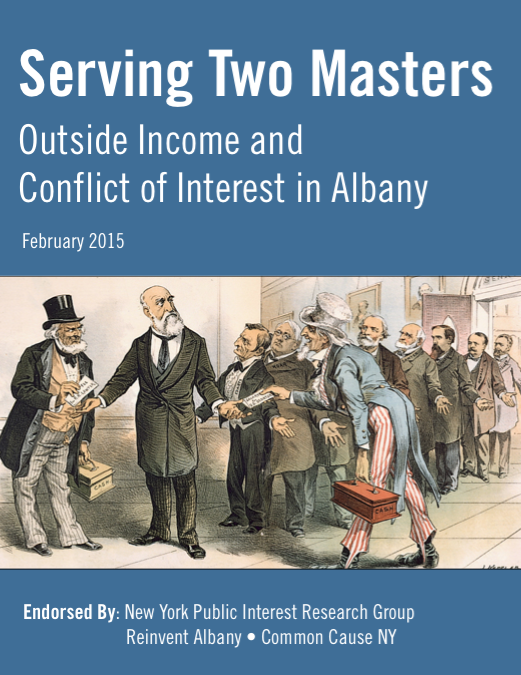An End to Serving Two Masters: Cap Legislator’s Outside Income Like Congress Does
Albany is in the midst of a long ethical meltdown. In just a few years we have seen a governor, comptroller, senate leaders and an assembly speaker arrested or deposed because of scandal. Most recently Sheldon Silver was indicted in part for hiding secret payments made from a law firm which employed him as a consultant. After Watergate, Congress passed major, lasting reforms. This is New York’s Watergate moment. The legislature needs to show it is serious, and a first step is capping outside income as Congress did decades ago.
Today, Reinvent Albany, NYPIRG, and Common Cause NY urged the governor and state lawmakers to agree to cap the outside income of state legislators at 15% of the highest salary paid to any sitting legislator. The groups bolstered their call for reform with a report, titled Serving Two Masters: Conflicts of Interest in Albany, which found that an overwhelming majority of state lawmakers already restrict their outside income. The report quotes the US House of Representative’s explanation of why they capped outside income:
“Many citizens perceive outside earned income as providing Members with an opportunity to ‘cash in’ on their positions of influence. Even if there is no actual impropriety, such sources of income give the appearance of impropriety and, in so doing, further undermine public confidence and trust in government officials.”
Serving Two Masters: Conflicts of Interest in Albany
Two-thirds of state lawmakers reported outside income of less than $20,000. This includes 35 of 53 state senators and 97 of 134 assembly members.
Recommendations
- Disclose all outside income. (Per Congress.)
- Cap outside income at 15% highest salary of sitting legislator. (Per Congress, by lower % to reflect NYS per diem, Congress does not have per diem.)
- Eliminate leadership stipends except majority and minority in each party. (Per Congress.)
- Adopt Code of Ethics.
- Adopt disclosure provisions based on Alaska and District of Columbia.

